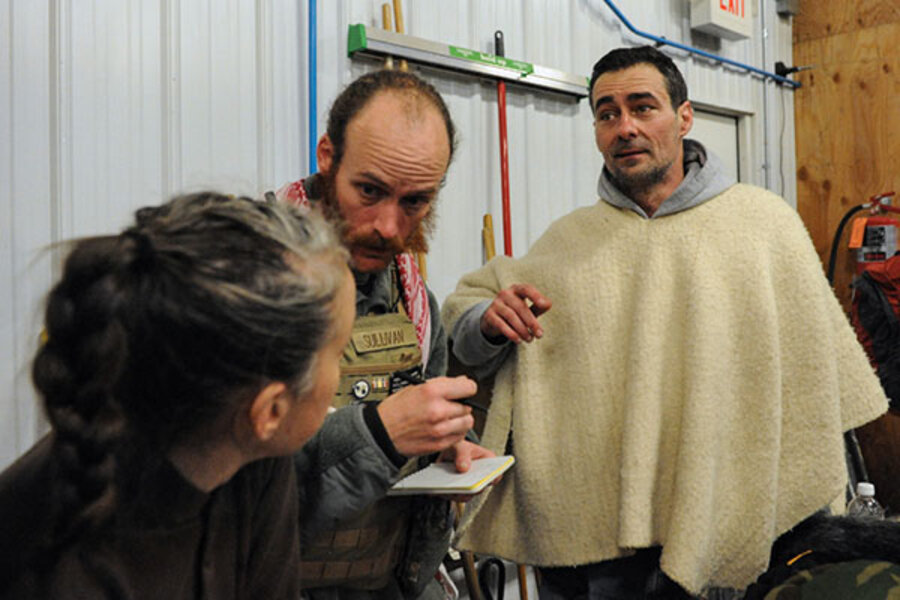Standing Rock: Veterans say they are there to help
Loading...
Tribal elders have asked the military veterans joining the large Dakota Access pipeline protest encampment not to have confrontations with law enforcement officials, an organizer with Veterans Stand for Standing Rock said Sunday, adding the group is there to help out those who've dug in against the four-state, $3.8 billion project.
About 250 veterans gathered about a mile from the Oceti Sakowin, or Seven Council Fires, camp for a meeting with organizer Wes Clark Jr., the son of former Democratic presidential candidate Gen. Wesley Clark. The group had said about 2,000 veterans were coming to the camp, but it wasn't clear how many actually arrived.
"We have been asked by the elders not to do direct action," Wes Clark Jr. said. He then talked about North Dakota authorities' decision to move away from a key bridge north of the encampment by 4 p.m. Sunday if demonstrators agree to certain conditions, saying the National Guard and law enforcement have armored vehicles and are armed.
"If we come forward, they will attack us," Clark said. Instead, he told the veterans, "If you see someone who needs help, help them out."
The federal government has ordered people to leave the main encampment, which is on Army Corps of Engineers' land in southern North Dakota, by Monday. But demonstrators say they're prepared to stay, and federal, state and local authorities say they won't forcibly remove the protesters.
"The question was asked if we would consider pulling back from the Backwater Bridge," Cass County Sheriff Paul Laney said in a Saturday news release after a conversation between law enforcement and the group's organizers, "and the answer is yes! We want this to de-escalate."
Authorities said they'll move from the north end of the Backwater Bridge if protesters stay south of it and come to the bridge only if there is a prearranged meeting. Authorities also asked protesters not to remove barriers on the bridge, which they have said was damaged in the late October conflict that led to several people being hurt, including a serious arm injury.
Protesters also are not supposed to walk, ride or fly drones north of the bridge, Laney said. Any violation will "will result in their arrest," the statement said.
The bridge blockade is something that Standing Rock Sioux tribal chairman Dave Archambault has been asking to be removed, the Bismarck Tribune reports , and something he said he would to talk to Gov. Jack Dalrymple about when they meet in person. A date for that meeting hasn't been set.
Veterans Stand for Standing Rock's GoFundMe.com page had raised more than $1 million of its $1.2 million goal by Sunday — money due to go toward food, transportation and supplies.
"People are fighting for something, and I thought they could use my help," said Navy veteran and Harvard graduate student Art Grayson. The 29-year-old from Cambridge, Massachusetts, flew the first leg of the journey, then met up with other veterans and rode from Bismarck in the back of a pickup truck.
"For people to recognize we are here says a lot," Grayson said, adding that though he has finals this week, he told professors, "I'll see you when I get back."
Steven Perry, a 66-year-old Vietnam veteran who's a member of the Little Traverse Bay band of Odawa Indians in Michigan, spoke of one of the protesters' main concerns: that the pipeline could pollute drinking water.
"This is not just a native issue," the Traverse City, Michigan, man said, "This is an issue for everyone."
Perry also said of the veterans' gathering: "When we fought for this country, we fought for everyone."
On Monday, some veterans will take part in a prayer ceremony in which they'll apologize for historical detrimental conduct by the military toward Native Americans and ask for forgiveness, Clark said. He also said the veterans' presence at the campsite is "about right and wrong and peace and love."
The Standing Rock Sioux tribe and others want changes made to the route of the pipeline, which is largely complete except for a short segment that is planned to pass beneath a Missouri River reservoir. Dallas-based Energy Transfer Partners says it is unwilling to reroute the project.







